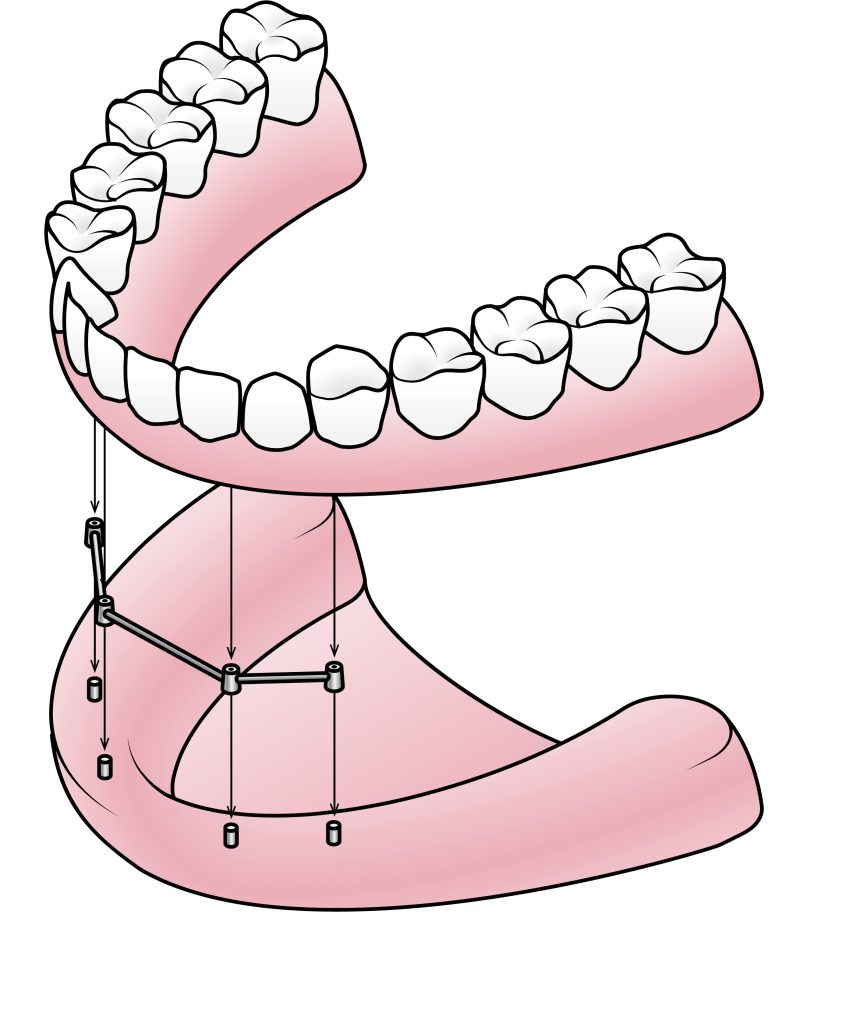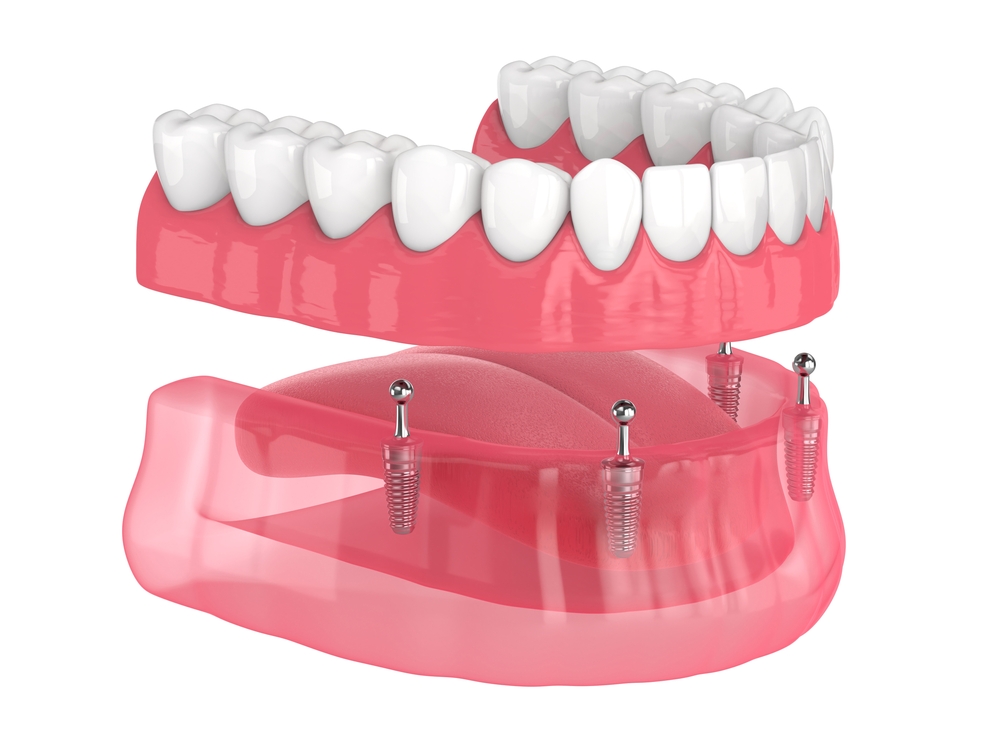“A very pleasant experience…”
Jeff P.
Marleton, New Jersey

Are you struggling with ill-fitting dentures that slip, click, or cause discomfort? Briglia Dental Group, led by West Chester, PA, dentist, Dr. Ron Briglia, offers a revolutionary solution – implant-supported dentures. This advanced dental treatment combines the stability of dental implants with the convenience of removable dentures, providing you with a secure, comfortable, and natural-looking smile.

Learn how we can restore oral health and your confidence in your ability to eat, speak, and smile freely by dialing (610) 615 0160 if you’re a new patient or (610) 692 4440 if you’re an existing patient.
Implant-supported dentures are a type of dental prosthesis that offers a stable and secure solution for individuals who have lost multiple teeth. Unlike traditional dentures, which rest on the gums, implant-supported dentures are anchored in place by dental implants surgically placed into the jawbone.
These implants serve as artificial tooth roots, providing a solid foundation for the denture to attach to. This design provides enhanced stability, comfort, and chewing efficiency over a conventional denture or dentures, allowing patients to regain confidence in their smiles and enjoy improved oral function.
Bar-retained dentures feature a thin metal bar that’s securely attached to two or more dental implants placed in the jawbone. The bar follows the contour of the jaw and acts as a stable anchor for the denture. The denture itself is custom-designed to fit snugly over the bar, utilizing clips or attachments to hold it in place. This design distributes chewing forces more evenly across the implants, reducing strain on individual implants and enhancing overall stability.

Also known as stud-attachment dentures, ball-retained dentures employ a system of ball-shaped attachments on the implants, which correspond to sockets embedded within the denture base. The balls and sockets create a secure connection that allows for easy removal and insertion of the denture. When the denture is in place, the balls snap firmly into the sockets, providing stability during chewing and speaking.
For screw-retained dentures, the denture is affixed to the implants through small screws. These screws are directly attached to the implants, providing a strong and stable foundation for the final denture itself. Screw-retained dentures offer excellent stability and are often preferred for their durability and ease of maintenance.
Locator-retained dentures utilize locator attachments, which consist of a male component attached to the implant and a corresponding female component embedded within the denture base. The male and female parts snap together, creating a secure connection while still allowing for easy removal and insertion of the denture.

Implant-supported dentures are an ideal solution for many people who have lost all or most of their natural teeth. However, certain factors need to be considered to determine if you are a suitable candidate for this treatment. Generally, individuals who qualify for implant-supported dentures should:
Before you’re approved for a new set of implant-retained dentures, you’ll attend an initial consultation with Dr. Briglia. During your initial visit with Dr. Briglia, he’ll carefully examine your dental history and discuss your goals and concerns. Together, you’ll decide if implant-supported dentures are right for you. Your consultation is a great time to ask any questions or voice any concerns you may have.

Before your implant surgery, Dr. Briglia may need to extract any remaining teeth to make room for the implant-retained dentures. Before your implant placement, we’ll apply a local anesthetic to ensure you don’t feel any discomfort or pain during the placement process.
Dr. Briglia will make small incisions into your gum tissue where the implants will go. Then, he’ll place the metal implants into your jawbone. Sometimes, he may need to take extra steps, like adding bone or lifting the sinus, to make sure the implants are secure.
After the surgery, your jawbone needs time to heal and fuse with the implants in a process called osseointegration. This usually takes around six to nine months, but it’s essential for making sure your dentures stay in place.
Once your jawbone is healed, Dr. Briglia will take impressions of your mouth. These are used to make custom dentures that fit perfectly. Skilled technicians create these dentures in a dental lab.
When your dentures are ready, they’ll be securely attached to the implants. This ensures they stay in place while you eat, talk, and smile comfortably.

Experience the life-changing benefits of implant-supported dentures at Briglia Dental Group. Dr. Ron Briglia and his team are committed to providing exceptional care and restoring your ability to eat, speak, and smile with confidence.
Call (610) 615 0160 if you’re a new patient or (610) 692 4440 for existing patients to schedule your consultation today. We welcome patients from West Chester, PA, and the surrounding areas such as Chester Springs, Exton, Broomall, and Chadds Ford, PA, offering a path to a secure, comfortable, and natural-looking smile.
Dr. Ron Briglia has been practicing dentistry since 1984. With decades of experience and extensive continuing education, Dr. Briglia provides the most comprehensive dental services.
He earned his Bachelor of Science from Gannon University and his Doctor of Dental Medicine from Temple University Dental School. He has received advanced training at prestigious organizations like Pankey and Las Vegas Institutes.
Most of Dr. Briglia’s patients have continued with him in his family of patients for over 30 – 35 years, and the restorations he has provided them have lasted for 25-35 years – clear evidence of his skills and expertise.
Connect with Dr. Ron Briglia on Linkedin
Briglia Dental Group is one of the highest rated dentists in West Chester PA.
Check out what some of our patients are saying about “Dr. Ron” and Briglia Dental Group.
Check out the latest advice, answers to popular questions and helpful information
from the dental experts at Briglia Dental Group.
